Ethical Frameworks, Stakeholders, and Business Operations Report
VerifiedAdded on 2021/07/20
|8
|3393
|221
Report
AI Summary
This report delves into the background and development of ethical approaches, differentiating between deontological and teleological ethical theories, and contrasting absolute and relative ethics. It explores ethical issues that affect business operations, such as discrimination and workplace harassment, and evaluates the implications of ethical conduct for businesses and their stakeholders. The report assesses potential conflicts among stakeholders and analyzes the impact of Corporate Social Responsibility (CSR) on the supply chain, providing recommendations for improving business ethics while meeting objectives and fostering good employer-employee relationships. It explains how business objectives are affected by ethical considerations and researches a current ethical issue affecting the hospitality industry, specifically the Accor Hotel Group, focusing on franchise operations and ethical dilemmas within the industry.
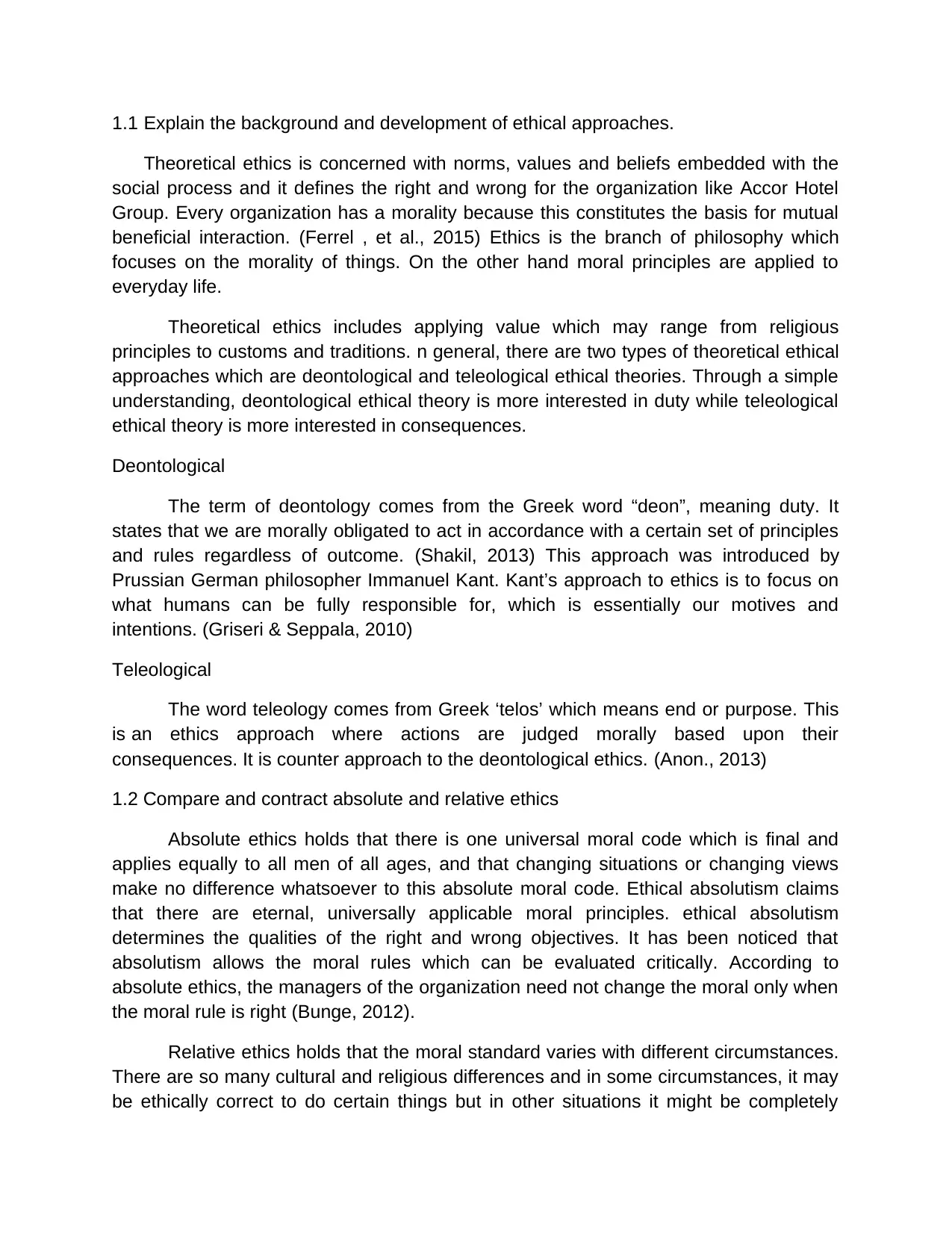
1.1 Explain the background and development of ethical approaches.
Theoretical ethics is concerned with norms, values and beliefs embedded with the
social process and it defines the right and wrong for the organization like Accor Hotel
Group. Every organization has a morality because this constitutes the basis for mutual
beneficial interaction. (Ferrel , et al., 2015) Ethics is the branch of philosophy which
focuses on the morality of things. On the other hand moral principles are applied to
everyday life.
Theoretical ethics includes applying value which may range from religious
principles to customs and traditions. n general, there are two types of theoretical ethical
approaches which are deontological and teleological ethical theories. Through a simple
understanding, deontological ethical theory is more interested in duty while teleological
ethical theory is more interested in consequences.
Deontological
The term of deontology comes from the Greek word “deon”, meaning duty. It
states that we are morally obligated to act in accordance with a certain set of principles
and rules regardless of outcome. (Shakil, 2013) This approach was introduced by
Prussian German philosopher Immanuel Kant. Kant’s approach to ethics is to focus on
what humans can be fully responsible for, which is essentially our motives and
intentions. (Griseri & Seppala, 2010)
Teleological
The word teleology comes from Greek ‘telos’ which means end or purpose. This
is an ethics approach where actions are judged morally based upon their
consequences. It is counter approach to the deontological ethics. (Anon., 2013)
1.2 Compare and contract absolute and relative ethics
Absolute ethics holds that there is one universal moral code which is final and
applies equally to all men of all ages, and that changing situations or changing views
make no difference whatsoever to this absolute moral code. Ethical absolutism claims
that there are eternal, universally applicable moral principles. ethical absolutism
determines the qualities of the right and wrong objectives. It has been noticed that
absolutism allows the moral rules which can be evaluated critically. According to
absolute ethics, the managers of the organization need not change the moral only when
the moral rule is right (Bunge, 2012).
Relative ethics holds that the moral standard varies with different circumstances.
There are so many cultural and religious differences and in some circumstances, it may
be ethically correct to do certain things but in other situations it might be completely
Theoretical ethics is concerned with norms, values and beliefs embedded with the
social process and it defines the right and wrong for the organization like Accor Hotel
Group. Every organization has a morality because this constitutes the basis for mutual
beneficial interaction. (Ferrel , et al., 2015) Ethics is the branch of philosophy which
focuses on the morality of things. On the other hand moral principles are applied to
everyday life.
Theoretical ethics includes applying value which may range from religious
principles to customs and traditions. n general, there are two types of theoretical ethical
approaches which are deontological and teleological ethical theories. Through a simple
understanding, deontological ethical theory is more interested in duty while teleological
ethical theory is more interested in consequences.
Deontological
The term of deontology comes from the Greek word “deon”, meaning duty. It
states that we are morally obligated to act in accordance with a certain set of principles
and rules regardless of outcome. (Shakil, 2013) This approach was introduced by
Prussian German philosopher Immanuel Kant. Kant’s approach to ethics is to focus on
what humans can be fully responsible for, which is essentially our motives and
intentions. (Griseri & Seppala, 2010)
Teleological
The word teleology comes from Greek ‘telos’ which means end or purpose. This
is an ethics approach where actions are judged morally based upon their
consequences. It is counter approach to the deontological ethics. (Anon., 2013)
1.2 Compare and contract absolute and relative ethics
Absolute ethics holds that there is one universal moral code which is final and
applies equally to all men of all ages, and that changing situations or changing views
make no difference whatsoever to this absolute moral code. Ethical absolutism claims
that there are eternal, universally applicable moral principles. ethical absolutism
determines the qualities of the right and wrong objectives. It has been noticed that
absolutism allows the moral rules which can be evaluated critically. According to
absolute ethics, the managers of the organization need not change the moral only when
the moral rule is right (Bunge, 2012).
Relative ethics holds that the moral standard varies with different circumstances.
There are so many cultural and religious differences and in some circumstances, it may
be ethically correct to do certain things but in other situations it might be completely
Paraphrase This Document
Need a fresh take? Get an instant paraphrase of this document with our AI Paraphraser
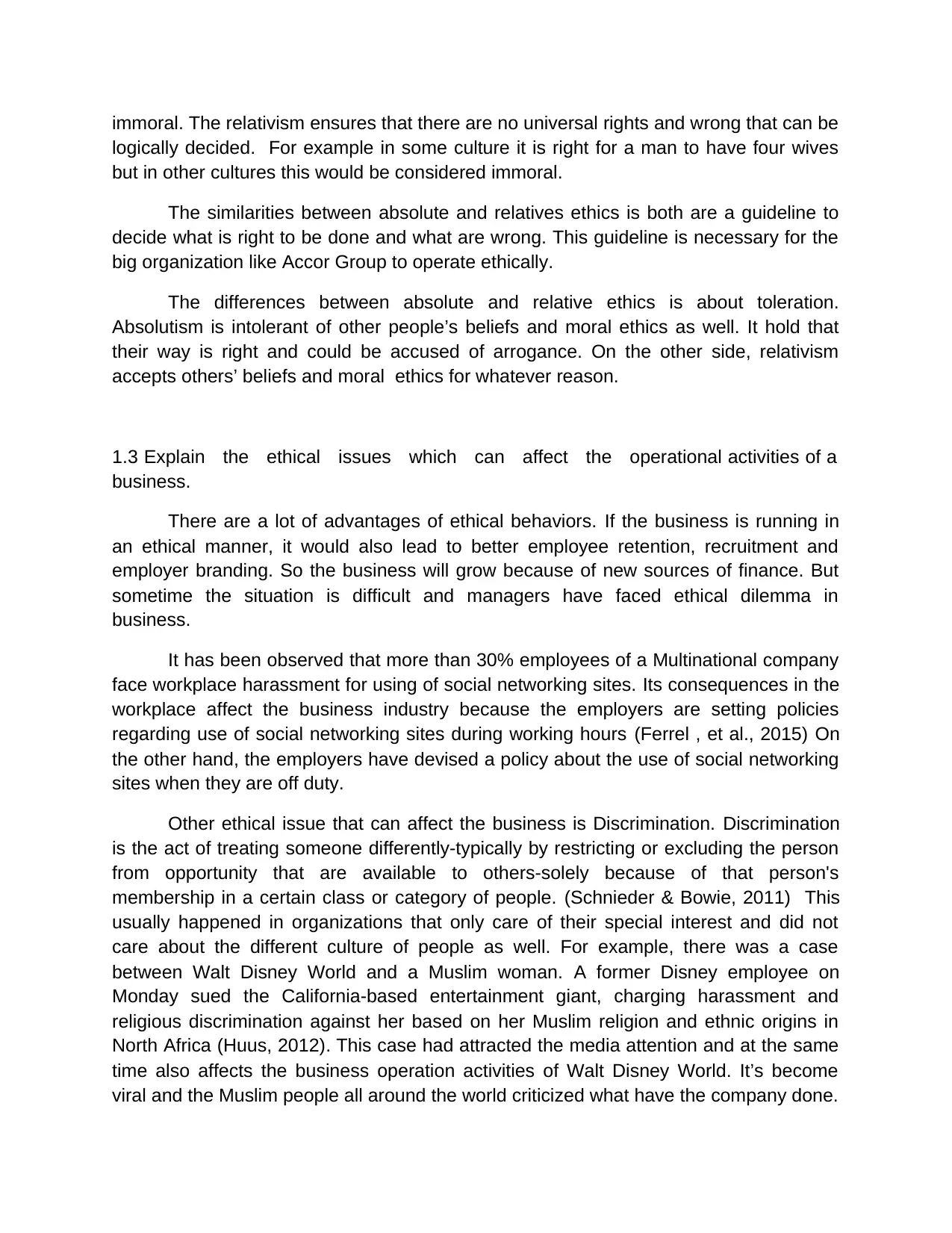
immoral. The relativism ensures that there are no universal rights and wrong that can be
logically decided. For example in some culture it is right for a man to have four wives
but in other cultures this would be considered immoral.
The similarities between absolute and relatives ethics is both are a guideline to
decide what is right to be done and what are wrong. This guideline is necessary for the
big organization like Accor Group to operate ethically.
The differences between absolute and relative ethics is about toleration.
Absolutism is intolerant of other people’s beliefs and moral ethics as well. It hold that
their way is right and could be accused of arrogance. On the other side, relativism
accepts others’ beliefs and moral ethics for whatever reason.
1.3 Explain the ethical issues which can affect the operational activities of a
business.
There are a lot of advantages of ethical behaviors. If the business is running in
an ethical manner, it would also lead to better employee retention, recruitment and
employer branding. So the business will grow because of new sources of finance. But
sometime the situation is difficult and managers have faced ethical dilemma in
business.
It has been observed that more than 30% employees of a Multinational company
face workplace harassment for using of social networking sites. Its consequences in the
workplace affect the business industry because the employers are setting policies
regarding use of social networking sites during working hours (Ferrel , et al., 2015) On
the other hand, the employers have devised a policy about the use of social networking
sites when they are off duty.
Other ethical issue that can affect the business is Discrimination. Discrimination
is the act of treating someone differently-typically by restricting or excluding the person
from opportunity that are available to others-solely because of that person's
membership in a certain class or category of people. (Schnieder & Bowie, 2011) This
usually happened in organizations that only care of their special interest and did not
care about the different culture of people as well. For example, there was a case
between Walt Disney World and a Muslim woman. A former Disney employee on
Monday sued the California-based entertainment giant, charging harassment and
religious discrimination against her based on her Muslim religion and ethnic origins in
North Africa (Huus, 2012). This case had attracted the media attention and at the same
time also affects the business operation activities of Walt Disney World. It’s become
viral and the Muslim people all around the world criticized what have the company done.
logically decided. For example in some culture it is right for a man to have four wives
but in other cultures this would be considered immoral.
The similarities between absolute and relatives ethics is both are a guideline to
decide what is right to be done and what are wrong. This guideline is necessary for the
big organization like Accor Group to operate ethically.
The differences between absolute and relative ethics is about toleration.
Absolutism is intolerant of other people’s beliefs and moral ethics as well. It hold that
their way is right and could be accused of arrogance. On the other side, relativism
accepts others’ beliefs and moral ethics for whatever reason.
1.3 Explain the ethical issues which can affect the operational activities of a
business.
There are a lot of advantages of ethical behaviors. If the business is running in
an ethical manner, it would also lead to better employee retention, recruitment and
employer branding. So the business will grow because of new sources of finance. But
sometime the situation is difficult and managers have faced ethical dilemma in
business.
It has been observed that more than 30% employees of a Multinational company
face workplace harassment for using of social networking sites. Its consequences in the
workplace affect the business industry because the employers are setting policies
regarding use of social networking sites during working hours (Ferrel , et al., 2015) On
the other hand, the employers have devised a policy about the use of social networking
sites when they are off duty.
Other ethical issue that can affect the business is Discrimination. Discrimination
is the act of treating someone differently-typically by restricting or excluding the person
from opportunity that are available to others-solely because of that person's
membership in a certain class or category of people. (Schnieder & Bowie, 2011) This
usually happened in organizations that only care of their special interest and did not
care about the different culture of people as well. For example, there was a case
between Walt Disney World and a Muslim woman. A former Disney employee on
Monday sued the California-based entertainment giant, charging harassment and
religious discrimination against her based on her Muslim religion and ethnic origins in
North Africa (Huus, 2012). This case had attracted the media attention and at the same
time also affects the business operation activities of Walt Disney World. It’s become
viral and the Muslim people all around the world criticized what have the company done.
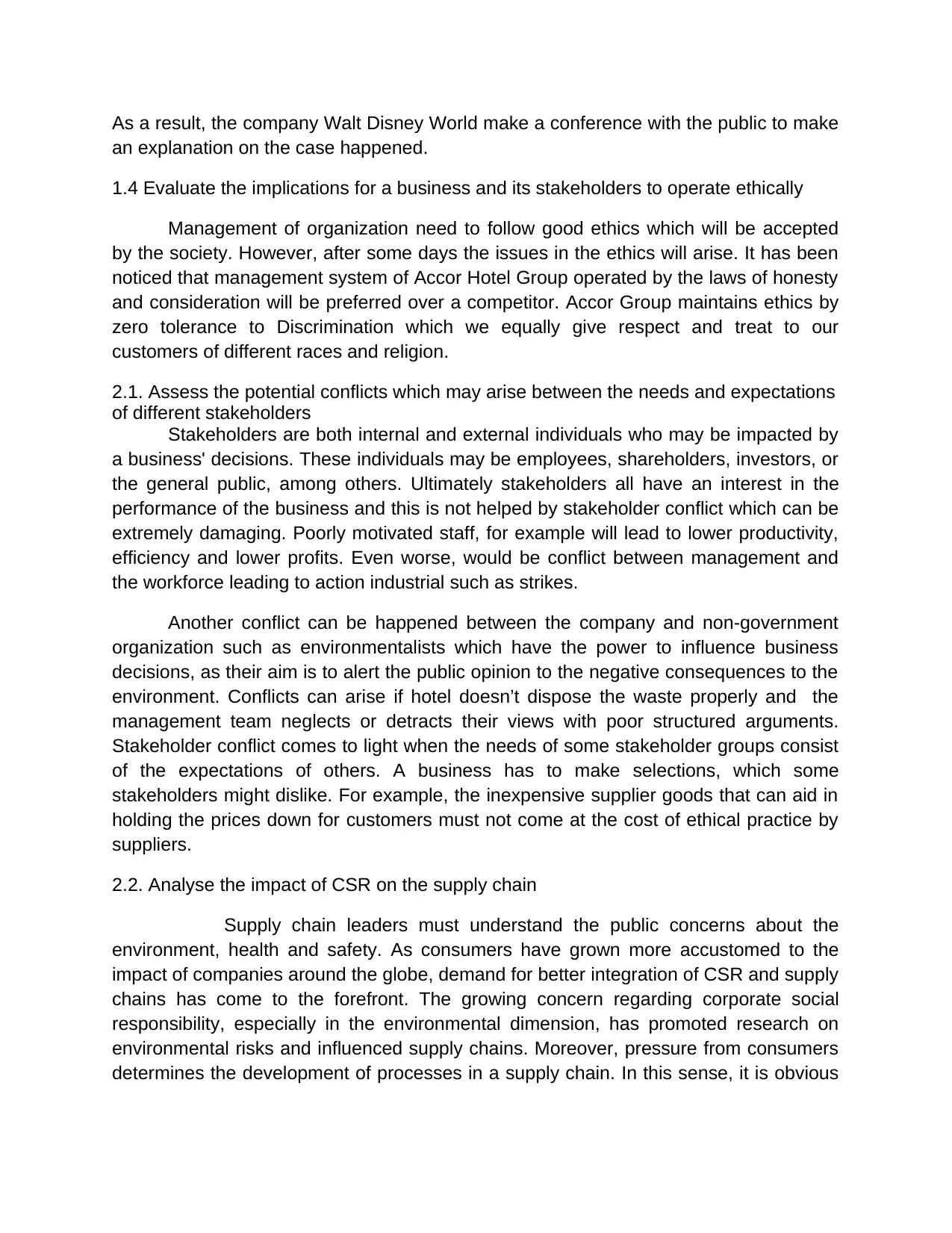
As a result, the company Walt Disney World make a conference with the public to make
an explanation on the case happened.
1.4 Evaluate the implications for a business and its stakeholders to operate ethically
Management of organization need to follow good ethics which will be accepted
by the society. However, after some days the issues in the ethics will arise. It has been
noticed that management system of Accor Hotel Group operated by the laws of honesty
and consideration will be preferred over a competitor. Accor Group maintains ethics by
zero tolerance to Discrimination which we equally give respect and treat to our
customers of different races and religion.
2.1. Assess the potential conflicts which may arise between the needs and expectations
of different stakeholders
Stakeholders are both internal and external individuals who may be impacted by
a business' decisions. These individuals may be employees, shareholders, investors, or
the general public, among others. Ultimately stakeholders all have an interest in the
performance of the business and this is not helped by stakeholder conflict which can be
extremely damaging. Poorly motivated staff, for example will lead to lower productivity,
efficiency and lower profits. Even worse, would be conflict between management and
the workforce leading to action industrial such as strikes.
Another conflict can be happened between the company and non-government
organization such as environmentalists which have the power to influence business
decisions, as their aim is to alert the public opinion to the negative consequences to the
environment. Conflicts can arise if hotel doesn’t dispose the waste properly and the
management team neglects or detracts their views with poor structured arguments.
Stakeholder conflict comes to light when the needs of some stakeholder groups consist
of the expectations of others. A business has to make selections, which some
stakeholders might dislike. For example, the inexpensive supplier goods that can aid in
holding the prices down for customers must not come at the cost of ethical practice by
suppliers.
2.2. Analyse the impact of CSR on the supply chain
Supply chain leaders must understand the public concerns about the
environment, health and safety. As consumers have grown more accustomed to the
impact of companies around the globe, demand for better integration of CSR and supply
chains has come to the forefront. The growing concern regarding corporate social
responsibility, especially in the environmental dimension, has promoted research on
environmental risks and influenced supply chains. Moreover, pressure from consumers
determines the development of processes in a supply chain. In this sense, it is obvious
an explanation on the case happened.
1.4 Evaluate the implications for a business and its stakeholders to operate ethically
Management of organization need to follow good ethics which will be accepted
by the society. However, after some days the issues in the ethics will arise. It has been
noticed that management system of Accor Hotel Group operated by the laws of honesty
and consideration will be preferred over a competitor. Accor Group maintains ethics by
zero tolerance to Discrimination which we equally give respect and treat to our
customers of different races and religion.
2.1. Assess the potential conflicts which may arise between the needs and expectations
of different stakeholders
Stakeholders are both internal and external individuals who may be impacted by
a business' decisions. These individuals may be employees, shareholders, investors, or
the general public, among others. Ultimately stakeholders all have an interest in the
performance of the business and this is not helped by stakeholder conflict which can be
extremely damaging. Poorly motivated staff, for example will lead to lower productivity,
efficiency and lower profits. Even worse, would be conflict between management and
the workforce leading to action industrial such as strikes.
Another conflict can be happened between the company and non-government
organization such as environmentalists which have the power to influence business
decisions, as their aim is to alert the public opinion to the negative consequences to the
environment. Conflicts can arise if hotel doesn’t dispose the waste properly and the
management team neglects or detracts their views with poor structured arguments.
Stakeholder conflict comes to light when the needs of some stakeholder groups consist
of the expectations of others. A business has to make selections, which some
stakeholders might dislike. For example, the inexpensive supplier goods that can aid in
holding the prices down for customers must not come at the cost of ethical practice by
suppliers.
2.2. Analyse the impact of CSR on the supply chain
Supply chain leaders must understand the public concerns about the
environment, health and safety. As consumers have grown more accustomed to the
impact of companies around the globe, demand for better integration of CSR and supply
chains has come to the forefront. The growing concern regarding corporate social
responsibility, especially in the environmental dimension, has promoted research on
environmental risks and influenced supply chains. Moreover, pressure from consumers
determines the development of processes in a supply chain. In this sense, it is obvious
⊘ This is a preview!⊘
Do you want full access?
Subscribe today to unlock all pages.

Trusted by 1+ million students worldwide
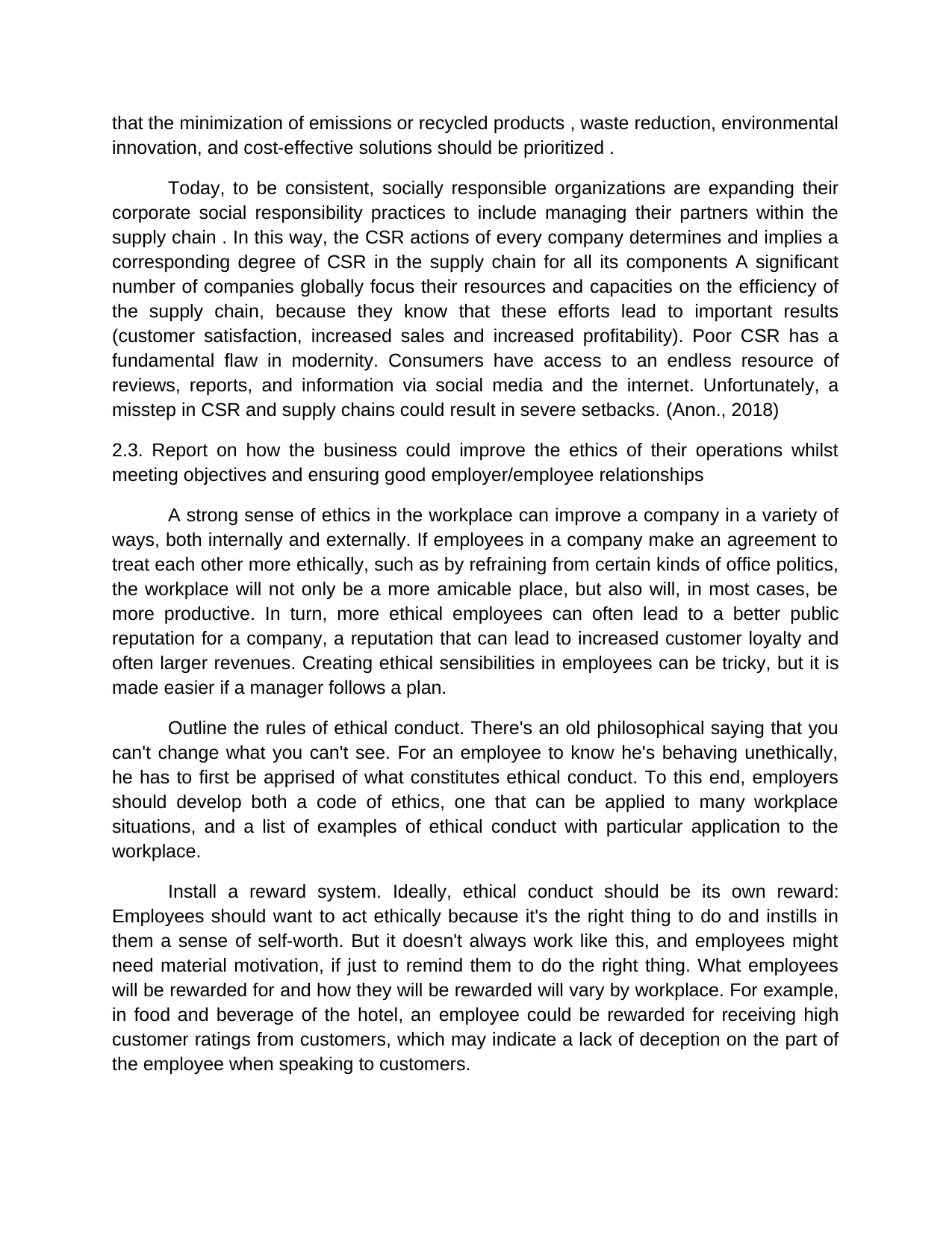
that the minimization of emissions or recycled products , waste reduction, environmental
innovation, and cost-effective solutions should be prioritized .
Today, to be consistent, socially responsible organizations are expanding their
corporate social responsibility practices to include managing their partners within the
supply chain . In this way, the CSR actions of every company determines and implies a
corresponding degree of CSR in the supply chain for all its components A significant
number of companies globally focus their resources and capacities on the efficiency of
the supply chain, because they know that these efforts lead to important results
(customer satisfaction, increased sales and increased profitability). Poor CSR has a
fundamental flaw in modernity. Consumers have access to an endless resource of
reviews, reports, and information via social media and the internet. Unfortunately, a
misstep in CSR and supply chains could result in severe setbacks. (Anon., 2018)
2.3. Report on how the business could improve the ethics of their operations whilst
meeting objectives and ensuring good employer/employee relationships
A strong sense of ethics in the workplace can improve a company in a variety of
ways, both internally and externally. If employees in a company make an agreement to
treat each other more ethically, such as by refraining from certain kinds of office politics,
the workplace will not only be a more amicable place, but also will, in most cases, be
more productive. In turn, more ethical employees can often lead to a better public
reputation for a company, a reputation that can lead to increased customer loyalty and
often larger revenues. Creating ethical sensibilities in employees can be tricky, but it is
made easier if a manager follows a plan.
Outline the rules of ethical conduct. There's an old philosophical saying that you
can't change what you can't see. For an employee to know he's behaving unethically,
he has to first be apprised of what constitutes ethical conduct. To this end, employers
should develop both a code of ethics, one that can be applied to many workplace
situations, and a list of examples of ethical conduct with particular application to the
workplace.
Install a reward system. Ideally, ethical conduct should be its own reward:
Employees should want to act ethically because it's the right thing to do and instills in
them a sense of self-worth. But it doesn't always work like this, and employees might
need material motivation, if just to remind them to do the right thing. What employees
will be rewarded for and how they will be rewarded will vary by workplace. For example,
in food and beverage of the hotel, an employee could be rewarded for receiving high
customer ratings from customers, which may indicate a lack of deception on the part of
the employee when speaking to customers.
innovation, and cost-effective solutions should be prioritized .
Today, to be consistent, socially responsible organizations are expanding their
corporate social responsibility practices to include managing their partners within the
supply chain . In this way, the CSR actions of every company determines and implies a
corresponding degree of CSR in the supply chain for all its components A significant
number of companies globally focus their resources and capacities on the efficiency of
the supply chain, because they know that these efforts lead to important results
(customer satisfaction, increased sales and increased profitability). Poor CSR has a
fundamental flaw in modernity. Consumers have access to an endless resource of
reviews, reports, and information via social media and the internet. Unfortunately, a
misstep in CSR and supply chains could result in severe setbacks. (Anon., 2018)
2.3. Report on how the business could improve the ethics of their operations whilst
meeting objectives and ensuring good employer/employee relationships
A strong sense of ethics in the workplace can improve a company in a variety of
ways, both internally and externally. If employees in a company make an agreement to
treat each other more ethically, such as by refraining from certain kinds of office politics,
the workplace will not only be a more amicable place, but also will, in most cases, be
more productive. In turn, more ethical employees can often lead to a better public
reputation for a company, a reputation that can lead to increased customer loyalty and
often larger revenues. Creating ethical sensibilities in employees can be tricky, but it is
made easier if a manager follows a plan.
Outline the rules of ethical conduct. There's an old philosophical saying that you
can't change what you can't see. For an employee to know he's behaving unethically,
he has to first be apprised of what constitutes ethical conduct. To this end, employers
should develop both a code of ethics, one that can be applied to many workplace
situations, and a list of examples of ethical conduct with particular application to the
workplace.
Install a reward system. Ideally, ethical conduct should be its own reward:
Employees should want to act ethically because it's the right thing to do and instills in
them a sense of self-worth. But it doesn't always work like this, and employees might
need material motivation, if just to remind them to do the right thing. What employees
will be rewarded for and how they will be rewarded will vary by workplace. For example,
in food and beverage of the hotel, an employee could be rewarded for receiving high
customer ratings from customers, which may indicate a lack of deception on the part of
the employee when speaking to customers.
Paraphrase This Document
Need a fresh take? Get an instant paraphrase of this document with our AI Paraphraser
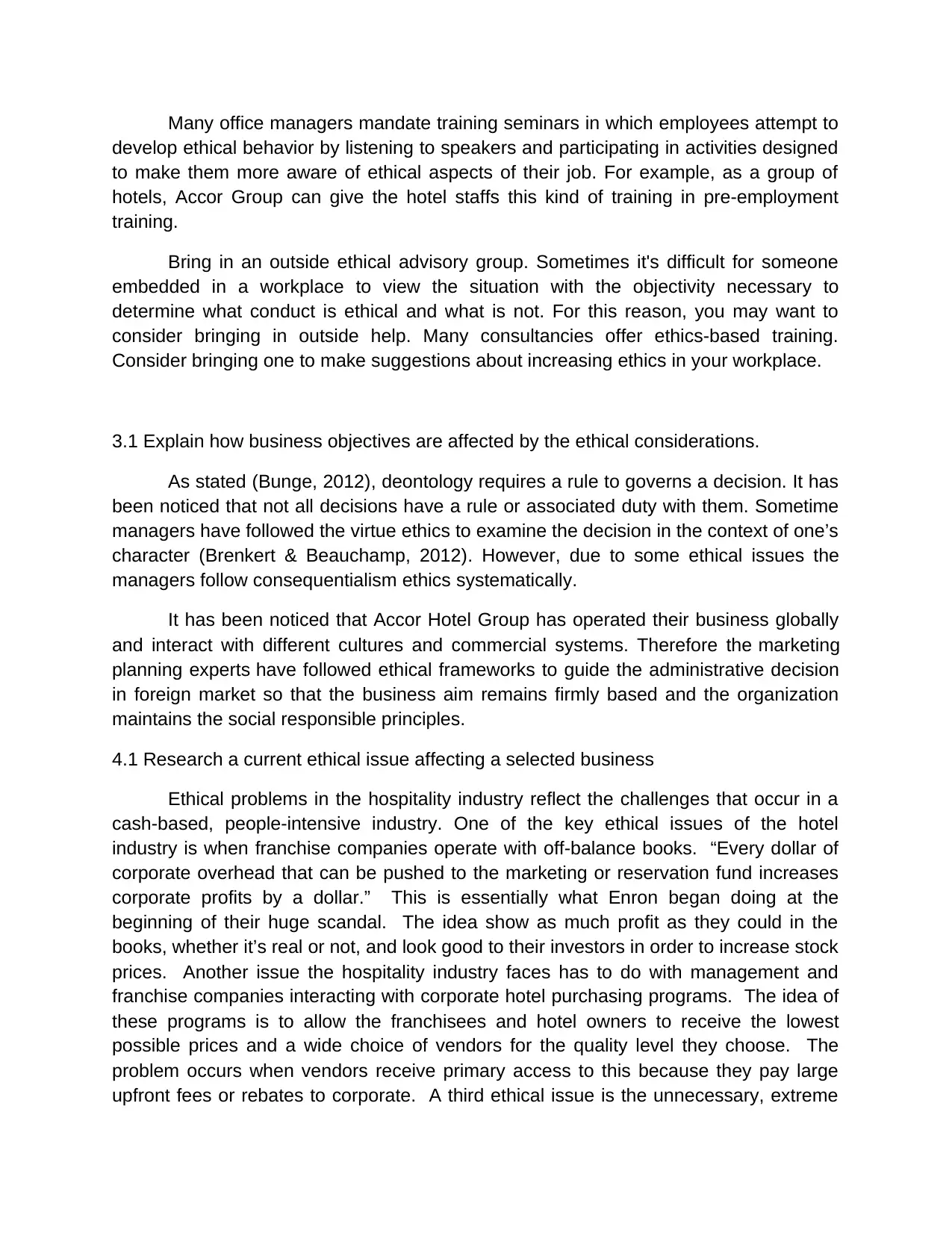
Many office managers mandate training seminars in which employees attempt to
develop ethical behavior by listening to speakers and participating in activities designed
to make them more aware of ethical aspects of their job. For example, as a group of
hotels, Accor Group can give the hotel staffs this kind of training in pre-employment
training.
Bring in an outside ethical advisory group. Sometimes it's difficult for someone
embedded in a workplace to view the situation with the objectivity necessary to
determine what conduct is ethical and what is not. For this reason, you may want to
consider bringing in outside help. Many consultancies offer ethics-based training.
Consider bringing one to make suggestions about increasing ethics in your workplace.
3.1 Explain how business objectives are affected by the ethical considerations.
As stated (Bunge, 2012), deontology requires a rule to governs a decision. It has
been noticed that not all decisions have a rule or associated duty with them. Sometime
managers have followed the virtue ethics to examine the decision in the context of one’s
character (Brenkert & Beauchamp, 2012). However, due to some ethical issues the
managers follow consequentialism ethics systematically.
It has been noticed that Accor Hotel Group has operated their business globally
and interact with different cultures and commercial systems. Therefore the marketing
planning experts have followed ethical frameworks to guide the administrative decision
in foreign market so that the business aim remains firmly based and the organization
maintains the social responsible principles.
4.1 Research a current ethical issue affecting a selected business
Ethical problems in the hospitality industry reflect the challenges that occur in a
cash-based, people-intensive industry. One of the key ethical issues of the hotel
industry is when franchise companies operate with off-balance books. “Every dollar of
corporate overhead that can be pushed to the marketing or reservation fund increases
corporate profits by a dollar.” This is essentially what Enron began doing at the
beginning of their huge scandal. The idea show as much profit as they could in the
books, whether it’s real or not, and look good to their investors in order to increase stock
prices. Another issue the hospitality industry faces has to do with management and
franchise companies interacting with corporate hotel purchasing programs. The idea of
these programs is to allow the franchisees and hotel owners to receive the lowest
possible prices and a wide choice of vendors for the quality level they choose. The
problem occurs when vendors receive primary access to this because they pay large
upfront fees or rebates to corporate. A third ethical issue is the unnecessary, extreme
develop ethical behavior by listening to speakers and participating in activities designed
to make them more aware of ethical aspects of their job. For example, as a group of
hotels, Accor Group can give the hotel staffs this kind of training in pre-employment
training.
Bring in an outside ethical advisory group. Sometimes it's difficult for someone
embedded in a workplace to view the situation with the objectivity necessary to
determine what conduct is ethical and what is not. For this reason, you may want to
consider bringing in outside help. Many consultancies offer ethics-based training.
Consider bringing one to make suggestions about increasing ethics in your workplace.
3.1 Explain how business objectives are affected by the ethical considerations.
As stated (Bunge, 2012), deontology requires a rule to governs a decision. It has
been noticed that not all decisions have a rule or associated duty with them. Sometime
managers have followed the virtue ethics to examine the decision in the context of one’s
character (Brenkert & Beauchamp, 2012). However, due to some ethical issues the
managers follow consequentialism ethics systematically.
It has been noticed that Accor Hotel Group has operated their business globally
and interact with different cultures and commercial systems. Therefore the marketing
planning experts have followed ethical frameworks to guide the administrative decision
in foreign market so that the business aim remains firmly based and the organization
maintains the social responsible principles.
4.1 Research a current ethical issue affecting a selected business
Ethical problems in the hospitality industry reflect the challenges that occur in a
cash-based, people-intensive industry. One of the key ethical issues of the hotel
industry is when franchise companies operate with off-balance books. “Every dollar of
corporate overhead that can be pushed to the marketing or reservation fund increases
corporate profits by a dollar.” This is essentially what Enron began doing at the
beginning of their huge scandal. The idea show as much profit as they could in the
books, whether it’s real or not, and look good to their investors in order to increase stock
prices. Another issue the hospitality industry faces has to do with management and
franchise companies interacting with corporate hotel purchasing programs. The idea of
these programs is to allow the franchisees and hotel owners to receive the lowest
possible prices and a wide choice of vendors for the quality level they choose. The
problem occurs when vendors receive primary access to this because they pay large
upfront fees or rebates to corporate. A third ethical issue is the unnecessary, extreme
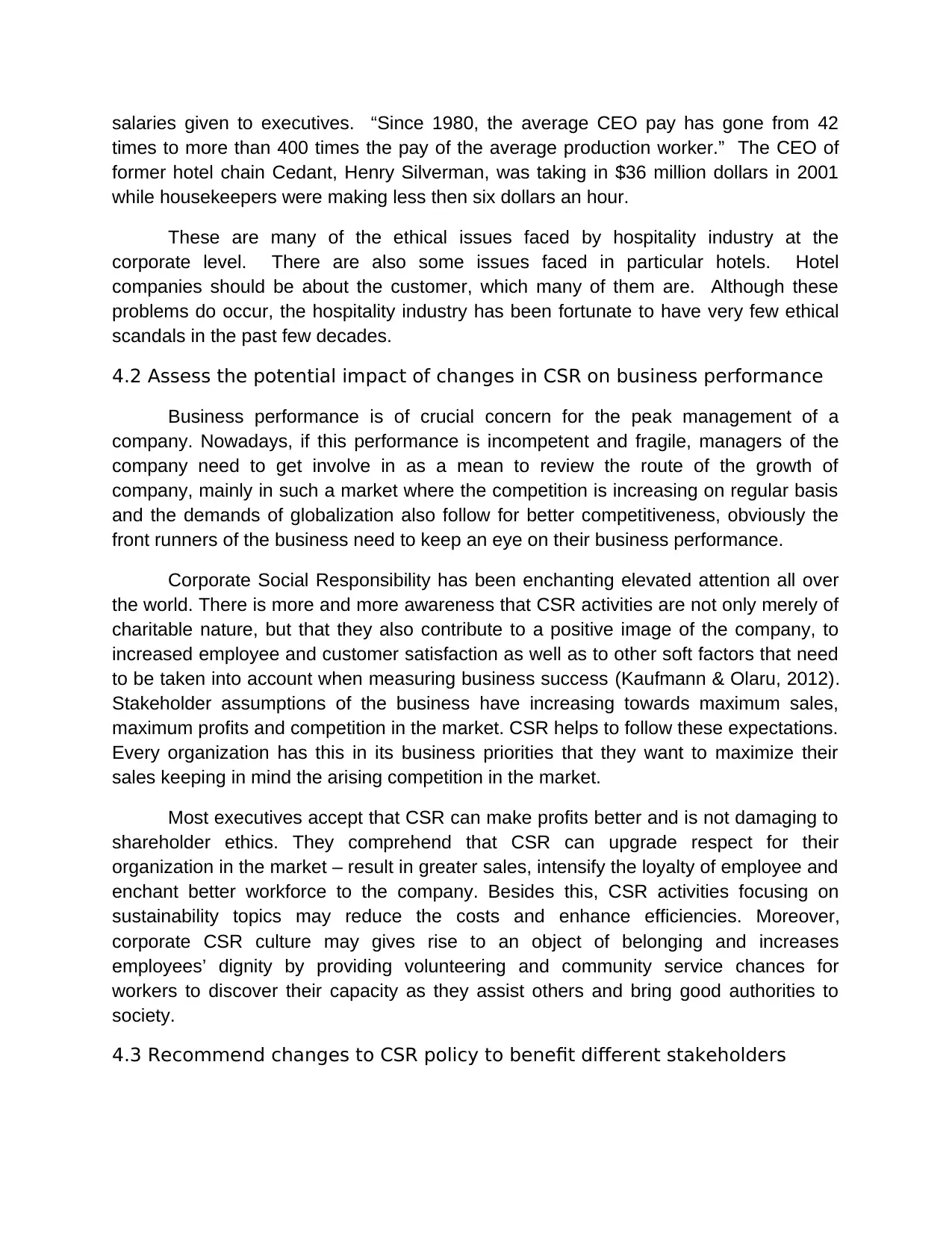
salaries given to executives. “Since 1980, the average CEO pay has gone from 42
times to more than 400 times the pay of the average production worker.” The CEO of
former hotel chain Cedant, Henry Silverman, was taking in $36 million dollars in 2001
while housekeepers were making less then six dollars an hour.
These are many of the ethical issues faced by hospitality industry at the
corporate level. There are also some issues faced in particular hotels. Hotel
companies should be about the customer, which many of them are. Although these
problems do occur, the hospitality industry has been fortunate to have very few ethical
scandals in the past few decades.
4.2 Assess the potential impact of changes in CSR on business performance
Business performance is of crucial concern for the peak management of a
company. Nowadays, if this performance is incompetent and fragile, managers of the
company need to get involve in as a mean to review the route of the growth of
company, mainly in such a market where the competition is increasing on regular basis
and the demands of globalization also follow for better competitiveness, obviously the
front runners of the business need to keep an eye on their business performance.
Corporate Social Responsibility has been enchanting elevated attention all over
the world. There is more and more awareness that CSR activities are not only merely of
charitable nature, but that they also contribute to a positive image of the company, to
increased employee and customer satisfaction as well as to other soft factors that need
to be taken into account when measuring business success (Kaufmann & Olaru, 2012).
Stakeholder assumptions of the business have increasing towards maximum sales,
maximum profits and competition in the market. CSR helps to follow these expectations.
Every organization has this in its business priorities that they want to maximize their
sales keeping in mind the arising competition in the market.
Most executives accept that CSR can make profits better and is not damaging to
shareholder ethics. They comprehend that CSR can upgrade respect for their
organization in the market – result in greater sales, intensify the loyalty of employee and
enchant better workforce to the company. Besides this, CSR activities focusing on
sustainability topics may reduce the costs and enhance efficiencies. Moreover,
corporate CSR culture may gives rise to an object of belonging and increases
employees’ dignity by providing volunteering and community service chances for
workers to discover their capacity as they assist others and bring good authorities to
society.
4.3 Recommend changes to CSR policy to benefit different stakeholders
times to more than 400 times the pay of the average production worker.” The CEO of
former hotel chain Cedant, Henry Silverman, was taking in $36 million dollars in 2001
while housekeepers were making less then six dollars an hour.
These are many of the ethical issues faced by hospitality industry at the
corporate level. There are also some issues faced in particular hotels. Hotel
companies should be about the customer, which many of them are. Although these
problems do occur, the hospitality industry has been fortunate to have very few ethical
scandals in the past few decades.
4.2 Assess the potential impact of changes in CSR on business performance
Business performance is of crucial concern for the peak management of a
company. Nowadays, if this performance is incompetent and fragile, managers of the
company need to get involve in as a mean to review the route of the growth of
company, mainly in such a market where the competition is increasing on regular basis
and the demands of globalization also follow for better competitiveness, obviously the
front runners of the business need to keep an eye on their business performance.
Corporate Social Responsibility has been enchanting elevated attention all over
the world. There is more and more awareness that CSR activities are not only merely of
charitable nature, but that they also contribute to a positive image of the company, to
increased employee and customer satisfaction as well as to other soft factors that need
to be taken into account when measuring business success (Kaufmann & Olaru, 2012).
Stakeholder assumptions of the business have increasing towards maximum sales,
maximum profits and competition in the market. CSR helps to follow these expectations.
Every organization has this in its business priorities that they want to maximize their
sales keeping in mind the arising competition in the market.
Most executives accept that CSR can make profits better and is not damaging to
shareholder ethics. They comprehend that CSR can upgrade respect for their
organization in the market – result in greater sales, intensify the loyalty of employee and
enchant better workforce to the company. Besides this, CSR activities focusing on
sustainability topics may reduce the costs and enhance efficiencies. Moreover,
corporate CSR culture may gives rise to an object of belonging and increases
employees’ dignity by providing volunteering and community service chances for
workers to discover their capacity as they assist others and bring good authorities to
society.
4.3 Recommend changes to CSR policy to benefit different stakeholders
⊘ This is a preview!⊘
Do you want full access?
Subscribe today to unlock all pages.

Trusted by 1+ million students worldwide
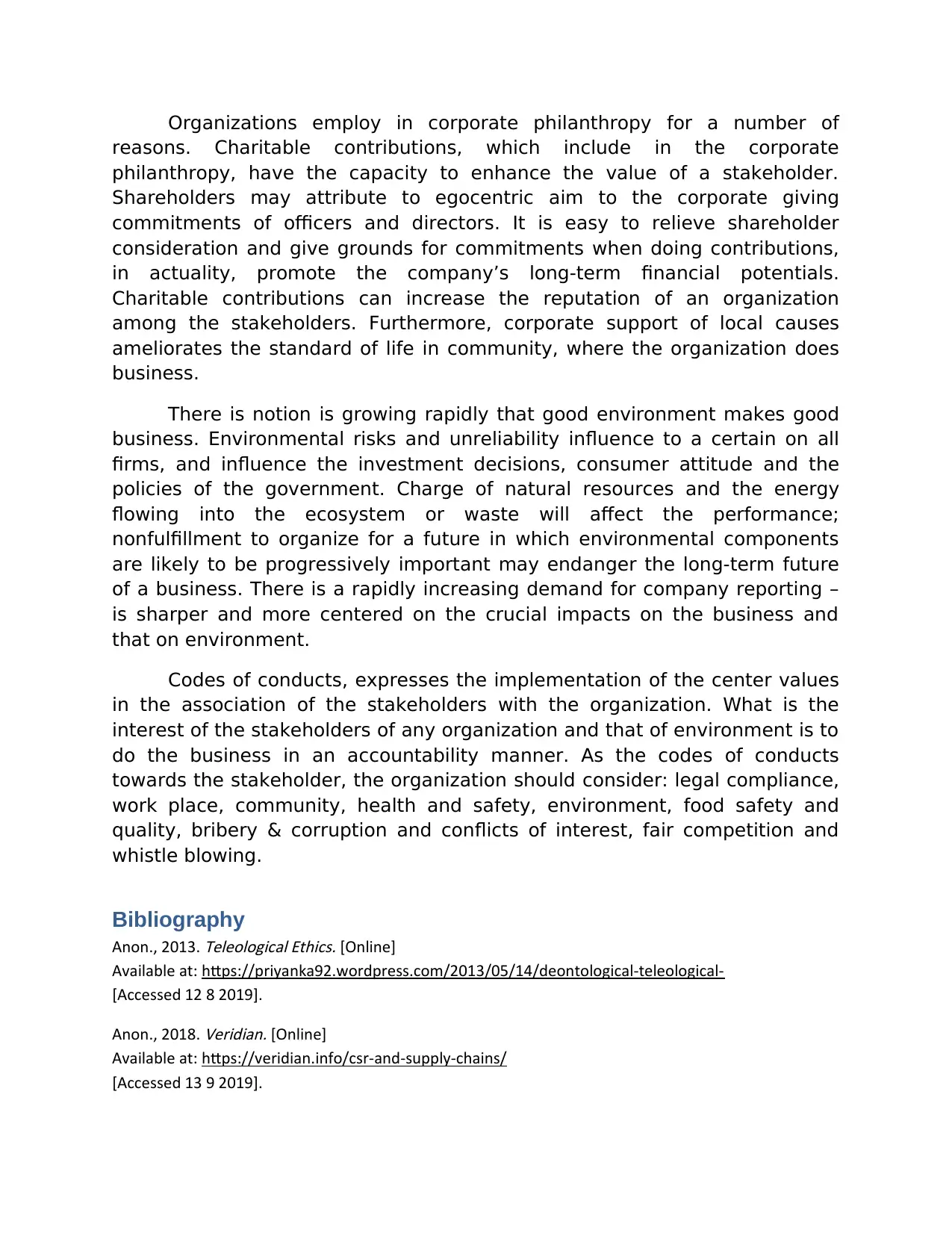
Organizations employ in corporate philanthropy for a number of
reasons. Charitable contributions, which include in the corporate
philanthropy, have the capacity to enhance the value of a stakeholder.
Shareholders may attribute to egocentric aim to the corporate giving
commitments of officers and directors. It is easy to relieve shareholder
consideration and give grounds for commitments when doing contributions,
in actuality, promote the company’s long-term financial potentials.
Charitable contributions can increase the reputation of an organization
among the stakeholders. Furthermore, corporate support of local causes
ameliorates the standard of life in community, where the organization does
business.
There is notion is growing rapidly that good environment makes good
business. Environmental risks and unreliability influence to a certain on all
firms, and influence the investment decisions, consumer attitude and the
policies of the government. Charge of natural resources and the energy
flowing into the ecosystem or waste will affect the performance;
nonfulfillment to organize for a future in which environmental components
are likely to be progressively important may endanger the long-term future
of a business. There is a rapidly increasing demand for company reporting –
is sharper and more centered on the crucial impacts on the business and
that on environment.
Codes of conducts, expresses the implementation of the center values
in the association of the stakeholders with the organization. What is the
interest of the stakeholders of any organization and that of environment is to
do the business in an accountability manner. As the codes of conducts
towards the stakeholder, the organization should consider: legal compliance,
work place, community, health and safety, environment, food safety and
quality, bribery & corruption and conflicts of interest, fair competition and
whistle blowing.
Bibliography
Anon., 2013.
Teleological Ethics. [Online]
Available at: https://priyanka92.wordpress.com/2013/05/14/deontological-teleological-
[Accessed 12 8 2019].
Anon., 2018.
Veridian. [Online]
Available at: https://veridian.info/csr-and-supply-chains/
[Accessed 13 9 2019].
reasons. Charitable contributions, which include in the corporate
philanthropy, have the capacity to enhance the value of a stakeholder.
Shareholders may attribute to egocentric aim to the corporate giving
commitments of officers and directors. It is easy to relieve shareholder
consideration and give grounds for commitments when doing contributions,
in actuality, promote the company’s long-term financial potentials.
Charitable contributions can increase the reputation of an organization
among the stakeholders. Furthermore, corporate support of local causes
ameliorates the standard of life in community, where the organization does
business.
There is notion is growing rapidly that good environment makes good
business. Environmental risks and unreliability influence to a certain on all
firms, and influence the investment decisions, consumer attitude and the
policies of the government. Charge of natural resources and the energy
flowing into the ecosystem or waste will affect the performance;
nonfulfillment to organize for a future in which environmental components
are likely to be progressively important may endanger the long-term future
of a business. There is a rapidly increasing demand for company reporting –
is sharper and more centered on the crucial impacts on the business and
that on environment.
Codes of conducts, expresses the implementation of the center values
in the association of the stakeholders with the organization. What is the
interest of the stakeholders of any organization and that of environment is to
do the business in an accountability manner. As the codes of conducts
towards the stakeholder, the organization should consider: legal compliance,
work place, community, health and safety, environment, food safety and
quality, bribery & corruption and conflicts of interest, fair competition and
whistle blowing.
Bibliography
Anon., 2013.
Teleological Ethics. [Online]
Available at: https://priyanka92.wordpress.com/2013/05/14/deontological-teleological-
[Accessed 12 8 2019].
Anon., 2018.
Veridian. [Online]
Available at: https://veridian.info/csr-and-supply-chains/
[Accessed 13 9 2019].
Paraphrase This Document
Need a fresh take? Get an instant paraphrase of this document with our AI Paraphraser
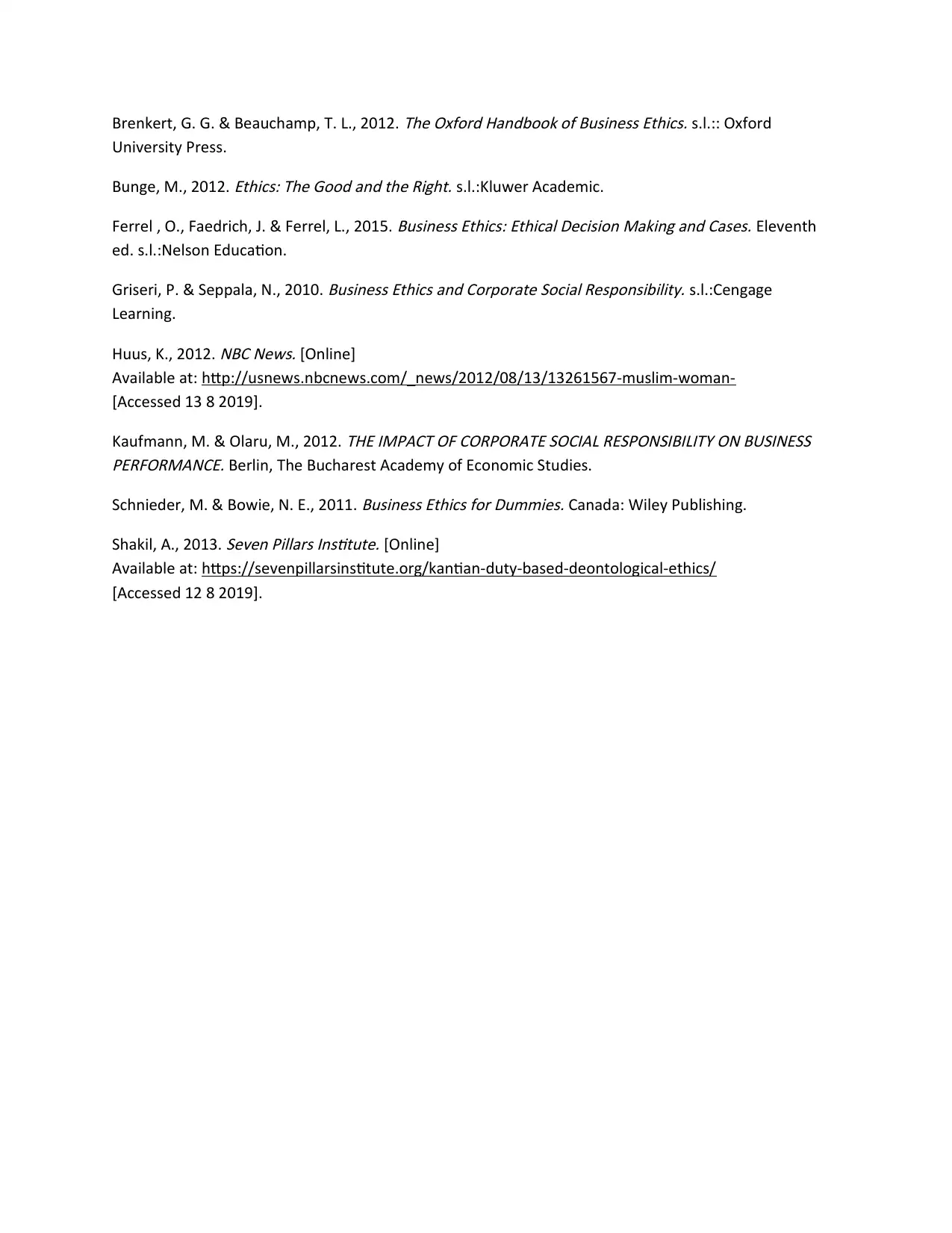
Brenkert, G. G. & Beauchamp, T. L., 2012.
The Oxford Handbook of Business Ethics. s.l.:: Oxford
University Press.
Bunge, M., 2012.
Ethics: The Good and the Right. s.l.:Kluwer Academic.
Ferrel , O., Faedrich, J. & Ferrel, L., 2015.
Business Ethics: Ethical Decision Making and Cases. Eleventh
ed. s.l.:Nelson Education.
Griseri, P. & Seppala, N., 2010.
Business Ethics and Corporate Social Responsibility. s.l.:Cengage
Learning.
Huus, K., 2012.
NBC News. [Online]
Available at: http://usnews.nbcnews.com/_news/2012/08/13/13261567-muslim-woman-
[Accessed 13 8 2019].
Kaufmann, M. & Olaru, M., 2012.
THE IMPACT OF CORPORATE SOCIAL RESPONSIBILITY ON BUSINESS
PERFORMANCE. Berlin, The Bucharest Academy of Economic Studies.
Schnieder, M. & Bowie, N. E., 2011.
Business Ethics for Dummies. Canada: Wiley Publishing.
Shakil, A., 2013.
Seven Pillars Institute. [Online]
Available at: https://sevenpillarsinstitute.org/kantian-duty-based-deontological-ethics/
[Accessed 12 8 2019].
The Oxford Handbook of Business Ethics. s.l.:: Oxford
University Press.
Bunge, M., 2012.
Ethics: The Good and the Right. s.l.:Kluwer Academic.
Ferrel , O., Faedrich, J. & Ferrel, L., 2015.
Business Ethics: Ethical Decision Making and Cases. Eleventh
ed. s.l.:Nelson Education.
Griseri, P. & Seppala, N., 2010.
Business Ethics and Corporate Social Responsibility. s.l.:Cengage
Learning.
Huus, K., 2012.
NBC News. [Online]
Available at: http://usnews.nbcnews.com/_news/2012/08/13/13261567-muslim-woman-
[Accessed 13 8 2019].
Kaufmann, M. & Olaru, M., 2012.
THE IMPACT OF CORPORATE SOCIAL RESPONSIBILITY ON BUSINESS
PERFORMANCE. Berlin, The Bucharest Academy of Economic Studies.
Schnieder, M. & Bowie, N. E., 2011.
Business Ethics for Dummies. Canada: Wiley Publishing.
Shakil, A., 2013.
Seven Pillars Institute. [Online]
Available at: https://sevenpillarsinstitute.org/kantian-duty-based-deontological-ethics/
[Accessed 12 8 2019].
1 out of 8
Related Documents
Your All-in-One AI-Powered Toolkit for Academic Success.
+13062052269
info@desklib.com
Available 24*7 on WhatsApp / Email
![[object Object]](/_next/static/media/star-bottom.7253800d.svg)
Unlock your academic potential
Copyright © 2020–2026 A2Z Services. All Rights Reserved. Developed and managed by ZUCOL.




